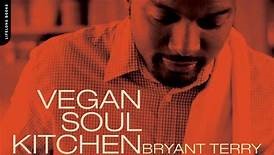About the Author
Bryant Terry is a James Beard award-winning eco-chef and food justice activist from Memphis, Tennessee. He is also a Food and Society Policy Fellow. Renowned for his activism in creating a healthy, just, and sustainable food system (Terry, 2014). He is currently in his third year as Chef-in-Residence at the Museum of the African Diaspora. Bryant uses cooking to shed light on connections with poverty and food insecurity. He also uses cooking to organize the food justice movement. In 2001, Bryant founded b-healthy! ( Build Healthy Eating and Lifestyles to Help Youth), a four-year initiative designed to empower youth to be active in creating a more just and sustainable food system. Besides coauthoring cookbooks and working on his own, Bryant presents at conferences and is on the advisory board for From Mothers to Mothers which postpartum food wisdom of immigrant and refugee Asian American Pacific Islander women.
 (Donnelly, 2014)
(Donnelly, 2014)
The Cookbook
Vegan Soul Kitchen is an African American cuisine cookbook that was created to offer tasty dishes to anyone with soul. This book was made for anyone and everyone; compiles tons of recipes from drinks to desserts. Being published in 2009, people got far away from the idea good food was accessible and available. Fast food companies were thriving and more processed food came into the picture. This particular cookbook as easy to follow recipes with ingredients you can get from any local grocery store or market. Bryant wanted to give people access to good, healthy food recipes to feed their families every day. Each recipe has a soundtrack with it for people to have fun while preparing meals. This audience didn’t have to be a professional to cook tasty eats.
“Bryant Terry knows that good food should be an everyday right and not a privilege” (Terry, 2009).
 (Gray, 2012)
(Gray, 2012)
Identity
The measurements for each recipe are relatively small and the equipment needed to prepare these dishes should come with ease to the person cooking. There are tons of tools offered in the book from knives to bowls and even a cutting board. Bryant wanted to offer different suggestions for each recipe for better convenience and capability. Vegan Soul Kitchen doesn’t apply to one gender or race over the other. Everyone is welcome to cook from this book with no exclusion. These meals are supposed to bring people together and bring joy to their hearts, not exclude those from benefitting from a good eat. Bryant created this cookbook to bring creative ideas back into cooking with different sauces and spices. His goal was to bring festive food back into the center of community. Bring celebration to weekends, dinners, and other special gatherings. These cuisines come from African American heritage, but all races, class, and gender are welcome with open arms. By making his book vegan based, he is providing healthy outlets from the grease and fats we consume daily.
“ I also hope too that Vegan Soul Kitchen helps shift African American cuisine back to our home gardens” (Terry, 2009).
“ But today we recognize the fallout of the food system—on our bodies, spirits, cultures, and communities—and it’s time now to get back to the land” (Terry, 2009).
Linkages
This cookbook relates to our discussion on cuisine because not only does it include recipes from African American staples, but also those from Native American and Caribbean. Taking dishes from different places to compile them into delicious treats. Links to food system because Bryant’s main purpose is to create a new food system to bring foods from older generations to generations of the present with the turn of the page. Finally links to social constructionism because Bryant wanted to refocus our relationship and attachment back to good food. People have close relations with food and Bryant made that his main goal to dig up the roots of recipes to bring back the connectiveness of food to our souls.
References
Terry, B. (2009). Vegan Soul Kitchen. Cambridge, MA: Da Capo Press
Terry, B. (2014). Long Bio. Retrieved from: www.bryant-terry.com